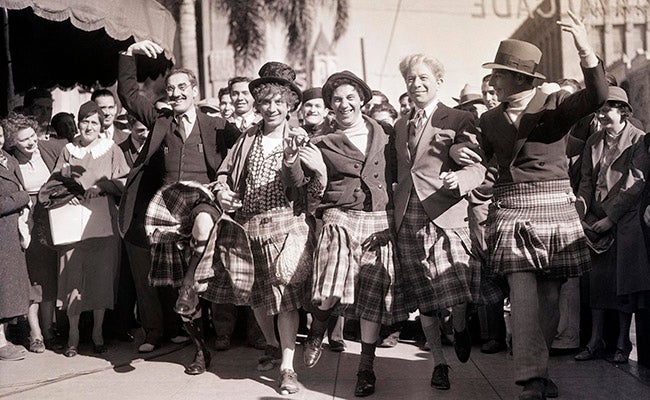‘A likely story – and probably true …’
Writing for the Autumn 2007 issue of the Folio Magazine, the writer and Observer film critic Philip French, who passed away in 2015, surveyed his own lifelong appreciation of the Marx Brothers and applauded how ‘the family leaps off the page to enchant us’ in a collection published by the Folio Society that year, The Best of the Marx Brothers.
[caption id="attachment_3659" align="aligncenter" width="617"] Philip French (1933–2015)[/caption]
Growing up in the 1930s and ’40s I thought there were three Marx Brothers. Pre-eminently the cool Groucho with the loping stoop, painted moustache, ever-present cigar and wisecracks delivered from the corner of the mouth. Then the aggressive Chico, novelty piano-player wearing a dingy Tyrolean outfit, speaking fractured English in an Italian accent.
Finally, and most popular at that time, the silent, innocently destructive Harpo, alternating between beatific smiles and nursery scowls, sporting a curly blond wig beneath a battered top hat, an endlessly capacious overcoat from which he could produce anything, a honking motor-car horn that, accompanied by elaborate mimes, helped him to communicate with the world, and, of course, delivering those angelic performances on the harp, an instrument that suddenly turned up in the most unlikely of places.
I don’t know in what order I saw the six movies the Marx Brothers made at MGM between 1935 and 1941 because they were constantly in distribution, but I certainly saw the last of them, The Big Store (1941), when it was first released. The first and best, A Night at the Opera (1935), I saw so often that by my teens I knew by heart the contract negotiation dialogue between Chico and Groucho.
[caption id="attachment_3660" align="aligncenter" width="700"]
Philip French (1933–2015)[/caption]
Growing up in the 1930s and ’40s I thought there were three Marx Brothers. Pre-eminently the cool Groucho with the loping stoop, painted moustache, ever-present cigar and wisecracks delivered from the corner of the mouth. Then the aggressive Chico, novelty piano-player wearing a dingy Tyrolean outfit, speaking fractured English in an Italian accent.
Finally, and most popular at that time, the silent, innocently destructive Harpo, alternating between beatific smiles and nursery scowls, sporting a curly blond wig beneath a battered top hat, an endlessly capacious overcoat from which he could produce anything, a honking motor-car horn that, accompanied by elaborate mimes, helped him to communicate with the world, and, of course, delivering those angelic performances on the harp, an instrument that suddenly turned up in the most unlikely of places.
I don’t know in what order I saw the six movies the Marx Brothers made at MGM between 1935 and 1941 because they were constantly in distribution, but I certainly saw the last of them, The Big Store (1941), when it was first released. The first and best, A Night at the Opera (1935), I saw so often that by my teens I knew by heart the contract negotiation dialogue between Chico and Groucho.
[caption id="attachment_3660" align="aligncenter" width="700"] A Night at the Opera (1935)[/caption]
Initially the Marx Brothers simply took their place in my affections alongside, but not superior to, the Crosby and Hope Road to … movies, Abbott and Costello, George Formby and Will Hay. I was sixteen before I saw one of their five Paramount films in a backstreet Bristol cinema. They all had meaningless titles (The Cocoanuts, Animal Crackers, Monkey Business, Horse Feathers and Duck Soup), and they featured a fourth brother, Zeppo, a semi-straight man, better-looking than the others but dull and awkward.
[caption id="attachment_3662" align="aligncenter" width="700"]
A Night at the Opera (1935)[/caption]
Initially the Marx Brothers simply took their place in my affections alongside, but not superior to, the Crosby and Hope Road to … movies, Abbott and Costello, George Formby and Will Hay. I was sixteen before I saw one of their five Paramount films in a backstreet Bristol cinema. They all had meaningless titles (The Cocoanuts, Animal Crackers, Monkey Business, Horse Feathers and Duck Soup), and they featured a fourth brother, Zeppo, a semi-straight man, better-looking than the others but dull and awkward.
[caption id="attachment_3662" align="aligncenter" width="700"] Duck Soup (1933)[/caption]
It was immediately obvious that these earlier, less polished productions were truly surreal and anarchic. They made no concessions to respectability and thrust steel poles into the spokes of the carriage trade. Shortly after that I came across a scintillating book, Crazy Like a Fox (1945), a collection of pieces by S. J. Perelman, friend of Groucho and co-screenwriter on Monkey Business and Horse Feathers. As a stylist Perelman combined the elegantly mandarin with the parodic and the colourfully demotic. He became, and remained, my favourite comic writer, and with the Marx Brothers became part of the exploration of America and the way in which Jewish immigrants shaped its popular culture that preoccupied me over the next twenty years.
My initial port of call was the pioneering collective biography, The Marx Brothers (1950) by Kyle S. Crichton, a former coalminer who wrote political film criticism for the Communist papers New Masses and the Daily Worker under the pseudonym Robert Forsythe. His lively work was my first encounter with the Brothers in print. I now have a shelf of books by, about, commenting on, quoting and reprinting scripts and routines of the Marx Brothers. Their most recent biographer, Simon Louvish, claims that ‘reading a script of a Marx Brothers show is like making love through an industrial-strength condom’. This Folio Society collection demonstrates from beginning to end the falsity of his vulgar claim. The family leaps off the page to enchant us in a way that the most sensitive descriptions of the activities, on and off screen, of Chaplin, Keaton and Harold Lloyd do not.
From Crichton’s book I learnt that the Brothers were the children of immigrant Jews, a feckless tailor for a father (said to be the worst in New York) and an ambitious, stage-struck mother, Minnie, who forced them all onto the stage as teenagers. I also came across the fifth brother, Gummo, who had a stammer and escaped from show business by volunteering for the US army in World War I, after which he made women’s dresses before becoming a respected theatrical agent. Gummo is now possibly best-known for the biography of him that a pretentious cineaste is writing in Woody Allen’s Stardust Memories (1980).
For decades I have lapped up books that contributed to the Brothers’ legend, offered different explanations as to how they got their sobriquets, and traced their long apprenticeships across the country in vaudeville, where they eventually became stars in around 1916. As vaudeville went into decline they switched to Broadway, had long runs in shows written by George S. Kaufman with songs by Irving Berlin and became celebrities. Just as crisis was striking the Great White Way in the wake of the 1929 Wall Street Crash, they switched to the movies, making their first two films (both based on Broadway hits) at Paramount’s Long Island studio and then in Los Angeles, which would be their base thereafter.
Zeppo quit in 1934 to go into management and real estate, inspiring Groucho’s great quip during contractual negotiations with MGM: ‘Without Zeppo we’re worth twice as much.’ This anticipates the celebrated 1960s joke by Groucho’s acerbic fan John Lennon: ‘Ringo isn’t even the best drummer in The Beatles.’
Duck Soup (1933)[/caption]
It was immediately obvious that these earlier, less polished productions were truly surreal and anarchic. They made no concessions to respectability and thrust steel poles into the spokes of the carriage trade. Shortly after that I came across a scintillating book, Crazy Like a Fox (1945), a collection of pieces by S. J. Perelman, friend of Groucho and co-screenwriter on Monkey Business and Horse Feathers. As a stylist Perelman combined the elegantly mandarin with the parodic and the colourfully demotic. He became, and remained, my favourite comic writer, and with the Marx Brothers became part of the exploration of America and the way in which Jewish immigrants shaped its popular culture that preoccupied me over the next twenty years.
My initial port of call was the pioneering collective biography, The Marx Brothers (1950) by Kyle S. Crichton, a former coalminer who wrote political film criticism for the Communist papers New Masses and the Daily Worker under the pseudonym Robert Forsythe. His lively work was my first encounter with the Brothers in print. I now have a shelf of books by, about, commenting on, quoting and reprinting scripts and routines of the Marx Brothers. Their most recent biographer, Simon Louvish, claims that ‘reading a script of a Marx Brothers show is like making love through an industrial-strength condom’. This Folio Society collection demonstrates from beginning to end the falsity of his vulgar claim. The family leaps off the page to enchant us in a way that the most sensitive descriptions of the activities, on and off screen, of Chaplin, Keaton and Harold Lloyd do not.
From Crichton’s book I learnt that the Brothers were the children of immigrant Jews, a feckless tailor for a father (said to be the worst in New York) and an ambitious, stage-struck mother, Minnie, who forced them all onto the stage as teenagers. I also came across the fifth brother, Gummo, who had a stammer and escaped from show business by volunteering for the US army in World War I, after which he made women’s dresses before becoming a respected theatrical agent. Gummo is now possibly best-known for the biography of him that a pretentious cineaste is writing in Woody Allen’s Stardust Memories (1980).
For decades I have lapped up books that contributed to the Brothers’ legend, offered different explanations as to how they got their sobriquets, and traced their long apprenticeships across the country in vaudeville, where they eventually became stars in around 1916. As vaudeville went into decline they switched to Broadway, had long runs in shows written by George S. Kaufman with songs by Irving Berlin and became celebrities. Just as crisis was striking the Great White Way in the wake of the 1929 Wall Street Crash, they switched to the movies, making their first two films (both based on Broadway hits) at Paramount’s Long Island studio and then in Los Angeles, which would be their base thereafter.
Zeppo quit in 1934 to go into management and real estate, inspiring Groucho’s great quip during contractual negotiations with MGM: ‘Without Zeppo we’re worth twice as much.’ This anticipates the celebrated 1960s joke by Groucho’s acerbic fan John Lennon: ‘Ringo isn’t even the best drummer in The Beatles.’
After the Brothers’ decline following their expulsion from MGM, Harpo retired into happy family life and Chico into obsessive gambling. Groucho, however, found a new life on the air, achieving his greatest popularity as host of a radio and TV quiz show, You Bet Your Life, on which contestants queued up to be insulted. Whilst Harpo and Zeppo wanted to love and be loved, Groucho was the ultimate malcontent. The Oscar Wilde of the wisecrack, he mocked the world, despising what he was, regretting the surgeon or the full-time writer he never became. His greatest satisfaction came from being quoted by H. L. Mencken in a supplement to The American Language (1919), corresponding with T. S. Eliot (one of the numerous literati who took up the Brothers) and being invited to deposit his papers in the Library of Congress. How would Groucho feel about being published by The Folio Society? He’d probably have been very pleased. But he’d almost certainly have said: ‘Please accept my resignation. I don’t want to belong to any book club that will accept me as a member.’
Regrettably The Best of the Marx Brothers, a collection of radio, film and stage scripts, letters and memoir by and about the Brothers, is no longer in print, but copies can be found at used booksellers, including Ardis Books.
[caption id="attachment_3659" align="aligncenter" width="617"]
 Philip French (1933–2015)[/caption]
Growing up in the 1930s and ’40s I thought there were three Marx Brothers. Pre-eminently the cool Groucho with the loping stoop, painted moustache, ever-present cigar and wisecracks delivered from the corner of the mouth. Then the aggressive Chico, novelty piano-player wearing a dingy Tyrolean outfit, speaking fractured English in an Italian accent.
Finally, and most popular at that time, the silent, innocently destructive Harpo, alternating between beatific smiles and nursery scowls, sporting a curly blond wig beneath a battered top hat, an endlessly capacious overcoat from which he could produce anything, a honking motor-car horn that, accompanied by elaborate mimes, helped him to communicate with the world, and, of course, delivering those angelic performances on the harp, an instrument that suddenly turned up in the most unlikely of places.
I don’t know in what order I saw the six movies the Marx Brothers made at MGM between 1935 and 1941 because they were constantly in distribution, but I certainly saw the last of them, The Big Store (1941), when it was first released. The first and best, A Night at the Opera (1935), I saw so often that by my teens I knew by heart the contract negotiation dialogue between Chico and Groucho.
[caption id="attachment_3660" align="aligncenter" width="700"]
Philip French (1933–2015)[/caption]
Growing up in the 1930s and ’40s I thought there were three Marx Brothers. Pre-eminently the cool Groucho with the loping stoop, painted moustache, ever-present cigar and wisecracks delivered from the corner of the mouth. Then the aggressive Chico, novelty piano-player wearing a dingy Tyrolean outfit, speaking fractured English in an Italian accent.
Finally, and most popular at that time, the silent, innocently destructive Harpo, alternating between beatific smiles and nursery scowls, sporting a curly blond wig beneath a battered top hat, an endlessly capacious overcoat from which he could produce anything, a honking motor-car horn that, accompanied by elaborate mimes, helped him to communicate with the world, and, of course, delivering those angelic performances on the harp, an instrument that suddenly turned up in the most unlikely of places.
I don’t know in what order I saw the six movies the Marx Brothers made at MGM between 1935 and 1941 because they were constantly in distribution, but I certainly saw the last of them, The Big Store (1941), when it was first released. The first and best, A Night at the Opera (1935), I saw so often that by my teens I knew by heart the contract negotiation dialogue between Chico and Groucho.
[caption id="attachment_3660" align="aligncenter" width="700"] A Night at the Opera (1935)[/caption]
Initially the Marx Brothers simply took their place in my affections alongside, but not superior to, the Crosby and Hope Road to … movies, Abbott and Costello, George Formby and Will Hay. I was sixteen before I saw one of their five Paramount films in a backstreet Bristol cinema. They all had meaningless titles (The Cocoanuts, Animal Crackers, Monkey Business, Horse Feathers and Duck Soup), and they featured a fourth brother, Zeppo, a semi-straight man, better-looking than the others but dull and awkward.
[caption id="attachment_3662" align="aligncenter" width="700"]
A Night at the Opera (1935)[/caption]
Initially the Marx Brothers simply took their place in my affections alongside, but not superior to, the Crosby and Hope Road to … movies, Abbott and Costello, George Formby and Will Hay. I was sixteen before I saw one of their five Paramount films in a backstreet Bristol cinema. They all had meaningless titles (The Cocoanuts, Animal Crackers, Monkey Business, Horse Feathers and Duck Soup), and they featured a fourth brother, Zeppo, a semi-straight man, better-looking than the others but dull and awkward.
[caption id="attachment_3662" align="aligncenter" width="700"] Duck Soup (1933)[/caption]
It was immediately obvious that these earlier, less polished productions were truly surreal and anarchic. They made no concessions to respectability and thrust steel poles into the spokes of the carriage trade. Shortly after that I came across a scintillating book, Crazy Like a Fox (1945), a collection of pieces by S. J. Perelman, friend of Groucho and co-screenwriter on Monkey Business and Horse Feathers. As a stylist Perelman combined the elegantly mandarin with the parodic and the colourfully demotic. He became, and remained, my favourite comic writer, and with the Marx Brothers became part of the exploration of America and the way in which Jewish immigrants shaped its popular culture that preoccupied me over the next twenty years.
My initial port of call was the pioneering collective biography, The Marx Brothers (1950) by Kyle S. Crichton, a former coalminer who wrote political film criticism for the Communist papers New Masses and the Daily Worker under the pseudonym Robert Forsythe. His lively work was my first encounter with the Brothers in print. I now have a shelf of books by, about, commenting on, quoting and reprinting scripts and routines of the Marx Brothers. Their most recent biographer, Simon Louvish, claims that ‘reading a script of a Marx Brothers show is like making love through an industrial-strength condom’. This Folio Society collection demonstrates from beginning to end the falsity of his vulgar claim. The family leaps off the page to enchant us in a way that the most sensitive descriptions of the activities, on and off screen, of Chaplin, Keaton and Harold Lloyd do not.
From Crichton’s book I learnt that the Brothers were the children of immigrant Jews, a feckless tailor for a father (said to be the worst in New York) and an ambitious, stage-struck mother, Minnie, who forced them all onto the stage as teenagers. I also came across the fifth brother, Gummo, who had a stammer and escaped from show business by volunteering for the US army in World War I, after which he made women’s dresses before becoming a respected theatrical agent. Gummo is now possibly best-known for the biography of him that a pretentious cineaste is writing in Woody Allen’s Stardust Memories (1980).
For decades I have lapped up books that contributed to the Brothers’ legend, offered different explanations as to how they got their sobriquets, and traced their long apprenticeships across the country in vaudeville, where they eventually became stars in around 1916. As vaudeville went into decline they switched to Broadway, had long runs in shows written by George S. Kaufman with songs by Irving Berlin and became celebrities. Just as crisis was striking the Great White Way in the wake of the 1929 Wall Street Crash, they switched to the movies, making their first two films (both based on Broadway hits) at Paramount’s Long Island studio and then in Los Angeles, which would be their base thereafter.
Zeppo quit in 1934 to go into management and real estate, inspiring Groucho’s great quip during contractual negotiations with MGM: ‘Without Zeppo we’re worth twice as much.’ This anticipates the celebrated 1960s joke by Groucho’s acerbic fan John Lennon: ‘Ringo isn’t even the best drummer in The Beatles.’
Duck Soup (1933)[/caption]
It was immediately obvious that these earlier, less polished productions were truly surreal and anarchic. They made no concessions to respectability and thrust steel poles into the spokes of the carriage trade. Shortly after that I came across a scintillating book, Crazy Like a Fox (1945), a collection of pieces by S. J. Perelman, friend of Groucho and co-screenwriter on Monkey Business and Horse Feathers. As a stylist Perelman combined the elegantly mandarin with the parodic and the colourfully demotic. He became, and remained, my favourite comic writer, and with the Marx Brothers became part of the exploration of America and the way in which Jewish immigrants shaped its popular culture that preoccupied me over the next twenty years.
My initial port of call was the pioneering collective biography, The Marx Brothers (1950) by Kyle S. Crichton, a former coalminer who wrote political film criticism for the Communist papers New Masses and the Daily Worker under the pseudonym Robert Forsythe. His lively work was my first encounter with the Brothers in print. I now have a shelf of books by, about, commenting on, quoting and reprinting scripts and routines of the Marx Brothers. Their most recent biographer, Simon Louvish, claims that ‘reading a script of a Marx Brothers show is like making love through an industrial-strength condom’. This Folio Society collection demonstrates from beginning to end the falsity of his vulgar claim. The family leaps off the page to enchant us in a way that the most sensitive descriptions of the activities, on and off screen, of Chaplin, Keaton and Harold Lloyd do not.
From Crichton’s book I learnt that the Brothers were the children of immigrant Jews, a feckless tailor for a father (said to be the worst in New York) and an ambitious, stage-struck mother, Minnie, who forced them all onto the stage as teenagers. I also came across the fifth brother, Gummo, who had a stammer and escaped from show business by volunteering for the US army in World War I, after which he made women’s dresses before becoming a respected theatrical agent. Gummo is now possibly best-known for the biography of him that a pretentious cineaste is writing in Woody Allen’s Stardust Memories (1980).
For decades I have lapped up books that contributed to the Brothers’ legend, offered different explanations as to how they got their sobriquets, and traced their long apprenticeships across the country in vaudeville, where they eventually became stars in around 1916. As vaudeville went into decline they switched to Broadway, had long runs in shows written by George S. Kaufman with songs by Irving Berlin and became celebrities. Just as crisis was striking the Great White Way in the wake of the 1929 Wall Street Crash, they switched to the movies, making their first two films (both based on Broadway hits) at Paramount’s Long Island studio and then in Los Angeles, which would be their base thereafter.
Zeppo quit in 1934 to go into management and real estate, inspiring Groucho’s great quip during contractual negotiations with MGM: ‘Without Zeppo we’re worth twice as much.’ This anticipates the celebrated 1960s joke by Groucho’s acerbic fan John Lennon: ‘Ringo isn’t even the best drummer in The Beatles.’
After the Brothers’ decline following their expulsion from MGM, Harpo retired into happy family life and Chico into obsessive gambling. Groucho, however, found a new life on the air, achieving his greatest popularity as host of a radio and TV quiz show, You Bet Your Life, on which contestants queued up to be insulted. Whilst Harpo and Zeppo wanted to love and be loved, Groucho was the ultimate malcontent. The Oscar Wilde of the wisecrack, he mocked the world, despising what he was, regretting the surgeon or the full-time writer he never became. His greatest satisfaction came from being quoted by H. L. Mencken in a supplement to The American Language (1919), corresponding with T. S. Eliot (one of the numerous literati who took up the Brothers) and being invited to deposit his papers in the Library of Congress. How would Groucho feel about being published by The Folio Society? He’d probably have been very pleased. But he’d almost certainly have said: ‘Please accept my resignation. I don’t want to belong to any book club that will accept me as a member.’
Regrettably The Best of the Marx Brothers, a collection of radio, film and stage scripts, letters and memoir by and about the Brothers, is no longer in print, but copies can be found at used booksellers, including Ardis Books.


